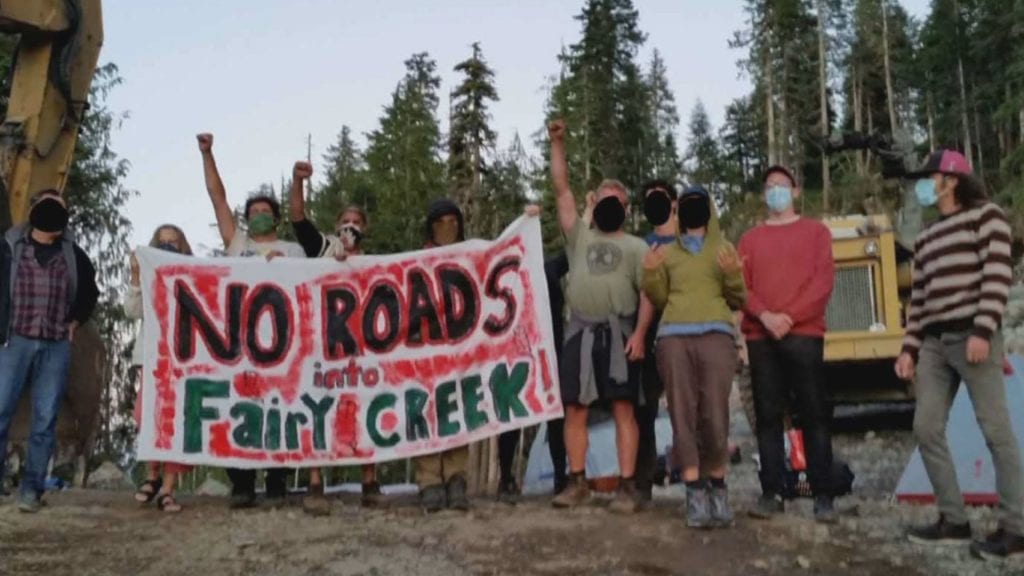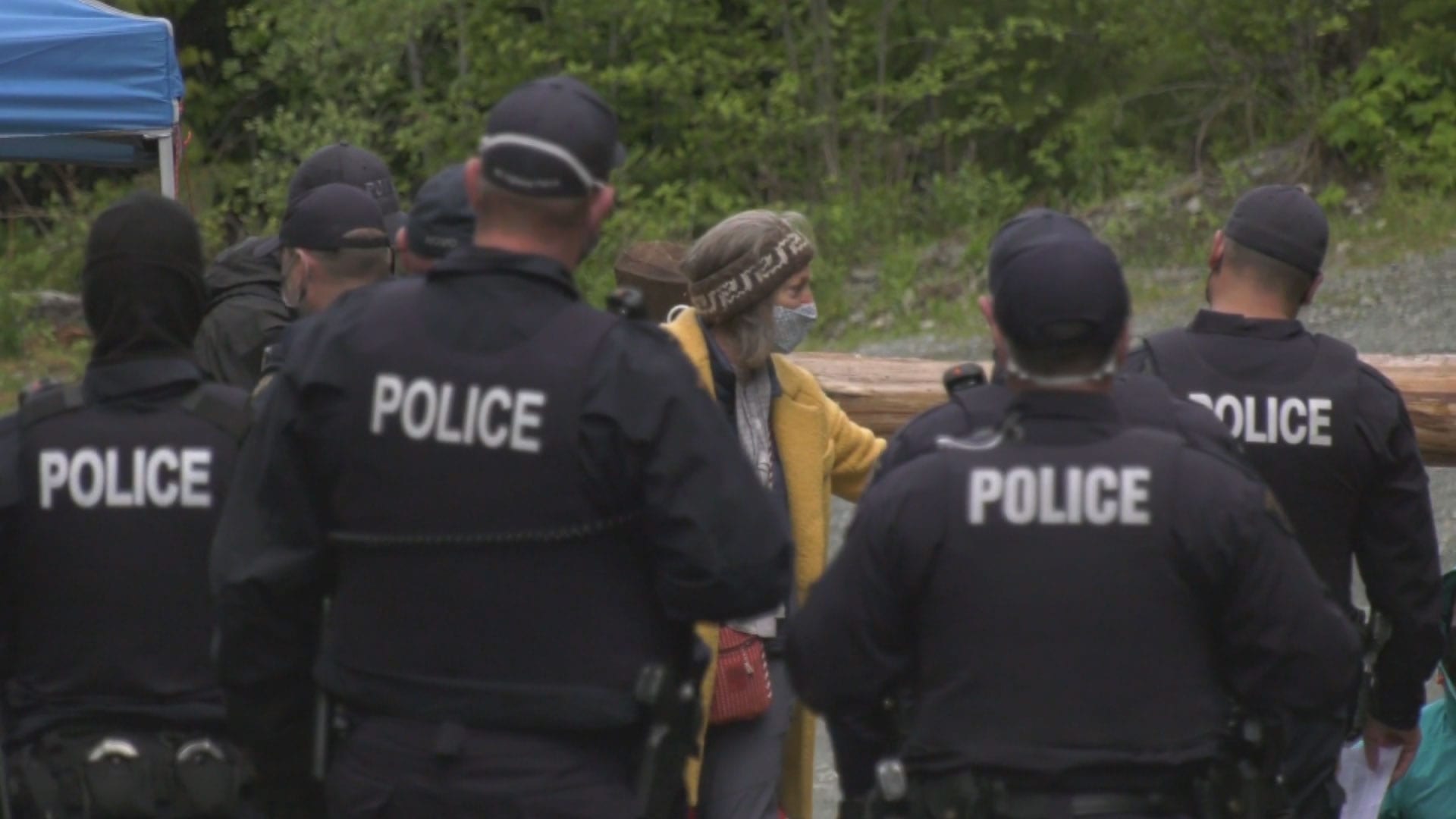
Protests at the Fairy Creek site have been ongoing since April.
A First Nation on Vancouver Island is denouncing the “increasing polarization” of its old-growth cedar forest.
Pacheedaht First Nation (PFN) made news in April when it told protestors to go home.
“Pacheedaht is concerned about the increasing polarization over forestry activities in our territory,” it said in a written statement.
“Decisions about the use of our forestry resources in our Territory need to be made by Pacheedaht.”
The nation of fewer than 300 members has issued regular statements asserting its Indigenous rights and title.
But the road blockades, led by anti-old growth logging group Rainforest Flying Squad (RFS), continue.
The group, comprised of non-Pacheedaht members, is targeting the work of Teal-Cedar Products Ltd., which said in court documents it stands to make an estimated $20 million from the Fairy Creek logging contract.
“Two-thousand year-old yellow cedar trees are at immediate risk,” RFS said in a release.
“Teal Jones is attempting to complete the road over the ridge into the Fairy Creek headwaters, where the largest 2000-year-old cedars stand.”
Fairy Creek, a watershed in the southwest corner of the island north of the San Juan River, is home to many ancient cedars.
The B.C. government considers trees more than 250 years old to be “ancient”.
Teal-Cedar, in its application for an injunction to curb the blockades, said it was operating under a licence from the B.C. government, which gives PFN a cut of stumpage fees.
In exchange, the band agrees not to oppose logging, Teal-Cedar added.
“In their letters to Teal, the PFN confirmed that after surveying the proposed cutblocks, nothing of archaeological significance was found, and the proposed development could proceed, subject to the laws and procedures of the Crown,” the court document obtained by APTN News said.
“The PFN also stated that they would not physically challenge the resource development by the Crown’s licensee, Teal.”

The same court document said two-thirds of the Fairy Creek parcel is off limits to loggers.
“Parts of the remainder of the Fairy Creek watershed not within TFL 46 are within the Qala:yit Community Forest Area. This area is 158 hectares in size,” Teal wrote.
“Timber is cut in this area by a partnership among the Cowichan Lake Community Forest Co-operative, the Pacheedaht First Nation, and the provincial government. 27 hectares is constrained from harvest in this area.”
One Pacheedaht member who supports the protesters is William (Bill) Jones.
Jones, an Elder, has said the old-growth forest is essential to his culture and religion.
He feels the court injunction obtained by Teal in March has strengthened the movement.
“It only empowers the protests, it will spread,” he said in an interview with APTN, “and it’s by our dedication and commitment to our caring for our Great Mother that other people are seeing it.”
Shawna Knight, who has lived on Vancouver Island for years and is part of RFS, said the group’s support comes from people with a wide range of reasons who don’t want to see old-growth trees logged in Fairy Creek.
“It’s a very unique place to be in an old-growth forest, there isn’t anywhere else in the world that has the same feeling and quiet and calm as an old-growth forest,” she said.
The band said it is working to preserve more of the forest as it negotiates treaty and governance rights with B.C. and Canada.
“Pacheedaht has always harvested and managed our forestry resources, including old-growth cedar, for cultural, ceremonial, domestic and economic purposes,” it said in a written statement.
“Our constitutional right to make decisions about forestry resources in our Territory, as a governing authority in our Territory, must be respected.”
It feels protesters are ignoring its role.
“Our community is being exploited as a backdrop for a provincial environmental campaign with insufficient regard to the proper Indigenous protocols, or the sovereignty, rights, wishes or needs of the Pacheedaht people,” band forestry manager Rod Bealing told APTN.
“As previously stated, we have obtained commitments from government and the licencee to protect specific areas of interest to our Nation whilst we conduct an Integrated Resource Stewardship Plan.”
The B.C. government confirmed it is working with Indigenous governments to manage and protect a beautiful and lucrative resource.
“We understand that how old growth forests are managed is an emotional, divisive, and complex issue,” said spokesperson Tyler Hooper in an emailed statement.
“B.C.’s beautiful ancient forests are part of what makes our province a great place to live and we owe it to future generations to protect them.”
The RCMP, meanwhile, have arrested 127 people so far for allegedly violating the court injunction.
The company said eight road blockades to date have disrupted employees and, at times, prevented them from working.
“Teal’s activities are lawful, and are all subject to permits issued by the Province of British Columbia,” the company told court.
“On the evidence, it is clear that the defendants are dissatisfied with the forestry policies of the provincial government relating to logging of old-growth forests. Their blockades are designed to interfere with and prevent Teal’s logging activities, and also to influence the government politically.”
Teal alleges RFS members number in the hundreds.
“The protestors and defendants are numerous, highly organized, and well-funded,” the company told court.
“They make extensive and sophisticated use of communications platforms, such as websites and social media, including Facebook and Twitter. They raise funds with an online campaign, which has raised over $100,000 to date.”
RFS said it does not oppose all logging but old-growth logging, specifically.
“We are proud of all our members who are willing to stand up for old-growth forests,” RFS member Kathleen Code said in a news release, “that the majority of British Columbians want to protect.”
RFS accused the B.C. government of reneging on an election promise to protect old-growth forests.
In granting the injunction, B.C. Supreme Court Justice Frits Verhoeven said Jones’s plea for freedom of religion was a constitutional argument for another court.
He also rejected an environmental argument that old growth trees help regulate climate change.
“The problem is, all of the concerns raised by the respondents are for the government to address, and not this Court,” Verhoeven wrote.
“Forestry decisions are highly policy driven and require the government to coordinate, balance, and reconcile often competing values and interests.”
Watch Lee Wilson’s story on the injunction and old growth forest:










